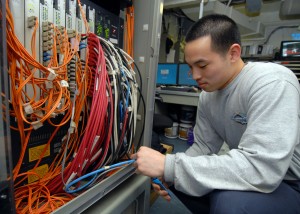Computer Hardware Career Field Background
 The computer industry has dramatically changed since the early 1800s when Charles Babbage conceived the basic parts of the modern computer. The Babbage model, known as the analytical engine, was composed of gears and levers and was the size of a desk calculator. Early computers, using vacuum tubes to store program concepts, were considered first-generation computers. The computer hardware industry took off with the arrival of the second-generation computers in the mid 1950s. Using components run by the newly invented transistor, these new computers were smaller, faster, more reliable, and easier to use. No more resetting switches or changing circuit boards!
The computer industry has dramatically changed since the early 1800s when Charles Babbage conceived the basic parts of the modern computer. The Babbage model, known as the analytical engine, was composed of gears and levers and was the size of a desk calculator. Early computers, using vacuum tubes to store program concepts, were considered first-generation computers. The computer hardware industry took off with the arrival of the second-generation computers in the mid 1950s. Using components run by the newly invented transistor, these new computers were smaller, faster, more reliable, and easier to use. No more resetting switches or changing circuit boards!
By the mid 1960s, third-generation computers were being built. The industry now had the capability of building smaller transistors grouped together to form integrated circuits (ICs). Many ICs were based on a small piece of silicon, called a chip. The technology developed in the following years allowed ICs to be smaller, faster, and more powerful. The microprocessor— thousands of ICs bundled onto a single chip—was invented in 1971. This ushered in the fourth generation of computers, which are still in use today. By the 1980s, competition among the industry giants, such as IBM, Apple, and Packard Bell, resulted in lower prices. Computers were now affordable for small businesses, as well as for home use.
Computers are getting smaller, yet becoming faster and more powerful in their capabilities. Computer hardware professionals are constantly experimenting, designing, and building smaller, stronger microchips and microcomputers to meet the demand. Products such as laptop computers, notebooks, handheld digital computers, and consumer products such as toys and appliances are tremendously popular. Their success has prompted computer companies to invest heavily in their design and development departments to produce the next high-tech item. The computer hardware industry also includes the manufacturing of peripherals such as modems, monitors, scanners, and just about anything you can attach to your computer. The popularity of computers, whether used for business, school, or personal entertainment, remains strong. This success hinges, in part, on the work of the computer hardware field where talented and driven individuals are needed to design, build, analyze, and serve the market.
See also:
